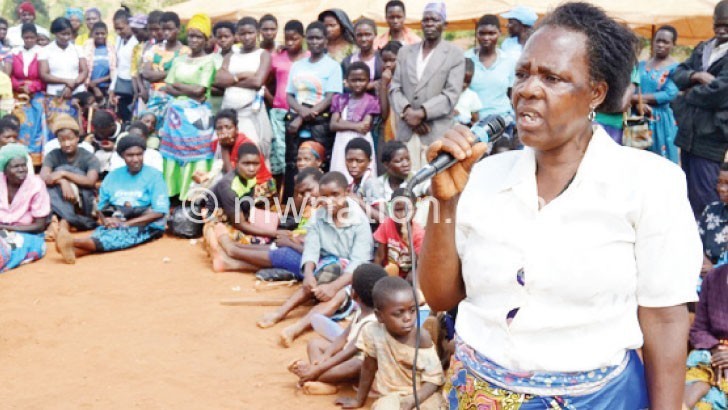Demystifying infertility
A dream for a blissful marriage life that Mary Magwira longed for remains an enigma to her because she cannot conceive.
In fact, the 55-year-old woman from Khaiya Village, Traditional Authority (T/A) Changata in Thyolo endured two decades of childlessness in wedlock.
Her community subjected her to total ridicule.
Every time she tells her story, Magwira emotionally breaks into tears.
“My house is near a premature babies’ graveyard. Since I do not have children, every time women come to this place, I am ridiculed and barred from attending the burials,” she laments.

To this effect, Magwira says she no longer enjoys life.
“When I got married to my husband in 1998, I was expecting to have four children.
“Unfortunately, this did not go as planned. I ended up without a child after being married for years,” she says.
Magwira leads a lonely and stressful life such that she fails to access medical help (fertility service) at the nearest Changata Health Centre for fear of being scoffed at by her fellow community members.
Currently, she cannot associate with fellow community members or attend any social gathering, including funerals, she says.
Magwira wishes there could be a solution to infertility to rescue couples from the affliction of stigma and discrimination which affected people are exposed to.
“I acknowledge that I’m too old to conceive. But it is my prayer that those younger than me will have their condition repaired and give birth just like any other woman,” she says.
Christopher Matchado and his wife Lucy from T/A Kapeni in Blantyre share similar sentiments.
Matchado says for eight years they have been married, a lot has been said about their childless marriage.
“I am a teacher and it has always been hard for me to work in an environment where all my colleagues have children.
“Sometimes, when I try to reprimand naughty learners, I end up being scorned by colleagues and the children’s parents,” he explains.
Matchado and Magwira exemplify the affliction of stigma and discrimination due to their condition.
Infertility is a disease of the reproductive system characterised by the failure to achieve a clinical pregnancy after 12 months or more of regular unprotected sex.
World Health Organisation (WHO) says infertility is a public health condition that equally affects both men and women.
Among others, infertility is caused by age, low sperm count in men, fibroids of the womb, extreme weight gain or loss and excessive alcohol consumption, physical or emotional stress that results in amenorrhea (absence of periods).
A 2010 research study report by WHO estimated that 48.5 million couples worldwide were unable to have a child.
The report indicates that 1.9 percent of women aged between 20 and 44, who wanted a child, were unable to have their first live birth (primary infertility).
Again, 10.5 percent of women who had previously given birth were unable to have another baby after five years of trying (secondary infertility).
In Malawi, although the true prevalence of infertility is not clear, a recent clinical study done at Kamuzu Central Hospital’s gynecology out-patient department estimates infertility at 6.3 percent.
Ministry of Health and Population spokesperson Joshua Malango says out of the estimated percentage, primary and secondary infertility is pegged at 11.9 percent and 20 percent, respectively.
“In Malawi, infertility and the stigma associated with it exist. However, stigma usually prevents some cases from being identified,” he says, adding: “Suffice to say that infertility does not only have effects on the couple failing to have a child; studies have also shown that it can lead to mental illness, abuse and stigma towards women.”
Moved by the situation, Merck Foundation in collaboration with the First Lady Gertrude Mutharika’s Beautify Malawi (Beam) Trust in July this year launched an infertility awareness programme to break the stigma.
Besides, Merck Foundation plans to train Malawian doctors in the management of non-communicable diseases such as cancer, diabetes and fertility care to improve access to equitable and quality healthcare.
Beam Trust special adviser on health and planning Emma Mabvumbe says 85 percent of infertility cases are reversible.
She says most cases happen due to sexually transmitted infections (STIs), low sperm count and abortions, conditions which can easily be treated.
“Quite often, infertility is repairable only if the person affected accesses medical attention in time,” Mabvumbe says.
She urges those affected by the condition to go to any clinic for treatment.
“Even if a couple may not have kids after seeking medical help, it is not the end of life. Remember, women are more than mothers and they deserve respect at all times,” she says.
So far, Beam Trust has reached out to communities in Mulanje, Thyolo and Blantyre with infertility messages and plans to extend to other districts across the country.
Weighing in on the matter, Senior Chief Chikumbu of Mulanje thanks the trust for raising awareness about the condition in the area.
She appeals to married couples not to file for divorce on the pretext of pressure from the community.





